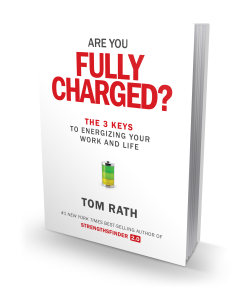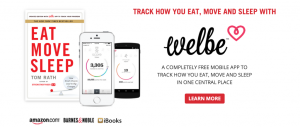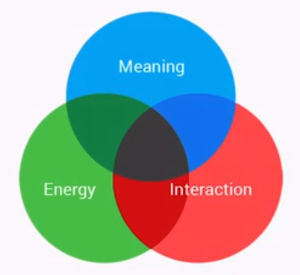Tom Rath's Blog
January 3, 2020
New this month: Two Books and a Website About Contribution
Happy New Year and thanks again for your interest in my work over the years. I wanted to let you know about a new project that I hope will be of benefit to your work and well-being. My overall aim is to help you start a bigger conversation about contribution in 2020.
Part I of this project is an exclusive collaboration with Amazon Original Stories. Different from a traditional business book, I wrote this deeply personal story as an introduction to what I have learned about living a life of contribution to others. This quick read, It’s Not About You: A Brief Guide to a Meaningful Life is available today and is free for all Prime members.

Part II of this project is a new business book, Life’s Great Question: Discover How You Contribute to the World, which will be available worldwide on February 4, 2020. This application-oriented book includes a code to the new companion website, Contribify, where readers build a personalized portfolio about how they best contribute to a team, organization, or community. My hope is this activity becomes a regular supplement, or even displaces, the impersonal and lifeless resume.

I will be sharing more in upcoming months but wanted to give you a quick preview and am eager to hear your thoughts.
Happy New Year!
Tom
“Life’s most persistent and urgent question is: what are you doing for others?”
– Dr. Martin Luther King, Jr.
The post New this month: Two Books and a Website About Contribution appeared first on Tom Rath.
New in 2020: Two Books and a Website
Happy New Year and thanks again for your interest in my work over the years. I wanted to let you know about a new project that I hope will be of benefit to your work and well-being. My overall aim is to help you start a bigger conversation about contribution in 2020.
Part I of this project is an exclusive collaboration with Amazon Original Stories. Different from a traditional business book, I wrote this deeply personal story as an introduction to what I have learned about living a life of contribution to others. This quick read, It’s Not About You: A Brief Guide to a Meaningful Life is available today and is free for all Prime members.

Part II of this project is a new business book, Life’s Great Question: Discover How You Contribute to the World, which will be available worldwide on February 4, 2020. This application-oriented book includes a code to the new companion website, Contribify, where readers build a personalized portfolio about how they best contribute to a team, organization, or community. My hope is this activity becomes a regular supplement, or even displaces, the impersonal and lifeless resume.

I will be sharing more in upcoming months but wanted to give you a quick preview and am eager to hear your thoughts.
Happy New Year!
Tom
“Life’s most persistent and urgent question is: what are you doing for others?”
– Dr. Martin Luther King, Jr.
The post New in 2020: Two Books and a Website appeared first on Tom Rath.
October 21, 2015
New e-Course: Fully Charging Work and Life
Friends,
A few months ago Udemy, one of the world’s leading providers of online education, approached me about creating a class based on my latest book Are You Fully Charged?. After learning more about their unique approach, I spent several days filming a series of classes and working with their team to create content that allows each to student to explore the three keys to daily well-being in more depth, at their own pace.
Because many of you have asked about options for additional learning (beyond books), I encourage you to check out the course. Learn to Fully Charge Your Work and Life is available today. It is designed for anyone looking to maximize their life and work by adding meaning to each day, improving the quality of their interactions, and ensuring they have the energy they need to be their best. This online class utilizes a combination of video lessons, real life examples, and supplemental material.
As a part of this launch, Udemy has agreed to offer lifetime access to the course for 50% off their retail prices through the end of this month (if you use the link below).
Click here to preview or enroll: Learn to Fully Charge Your Work and Life
I look forward to seeing you in the course and would love to hear your thoughts and ideas on this new learning format. Also, please feel free to forward this to friends and colleagues who may benefit.
Thanks and take care,
Tom
The post New e-Course: Fully Charging Work and Life appeared first on Tom Rath.
May 9, 2015
30 Byte-sized Ideas From Are You Fully Charged?
Fun list of outtakes from the new book, in a twitter-friendly format, from @FauziaBurke. For more about the book Are You Fully Charged? The Three Keys for Energizing Work and Life, visit this page.

(Highlight any of the following clips to share on Twitter or Facebook)
“Make work a purpose, not just a place.”
“Meaning does not happen to you — you create it.”
“The pursuit of meaning—not happiness—is what makes life worthwhile.”
“People who wrap their identity around their income rarely find satisfaction in their work.”
“The reality is, you don’t always have tomorrow to do what matters most.”
“The opportunity to do something you love will always be there, as long as you start today.”
“To do justice to those who have invested in you, live the life you want.”
“Work is like any other social network: both negative and positive emotions spread quickly.”
“What will matter later in life is what you initiate today, not what you respond to.”
“Being “busy” is often the antithesis of working on what matters most.”
“Focus on less to do more.”
“Trying to do a little bit of everything leads to doing nothing of substance.”
“You have the ability to add a positive charge to every conversation.”
“Every hour of sleep is an investment in your future, not an expense.”
“Being active throughout the day is the key to staying energized.”
“Sitting may be the most underrated health threat of this generation.”
“You simply think better when you move more.”
“The actions you take throughout every single day accumulate to shape your overall life.”
“Life is a composite of millions of individual interactions.”
“If you try to be good at everything, you eliminate your chances of being great at anything.”
“Best way to use your financial resources is to spend them on meaningful experiences.”
“The food you eat not only influences your energy levels, it also affects your mood.”
“On a global level, inactivity now kills more people than cigarettes.”
“Creating meaning for others matters more than pursuing happiness for yourself.”
“Meaningful work is driven by deep, internal motivation.”
“Your work should improve your overall well-being.”
“Focus most of your time and attention on what is working.”
“Social networks, that we often take for granted, profoundly shape our lives.”
“Spending on people and experiences yields the greatest return.”
“The best moments in life rarely happen while you are sitting around alone.”
The post 30 Byte-sized Ideas From Are You Fully Charged? appeared first on Tom Rath.
May 5, 2015
Meaning Matters More Than Happiness
By Tom Rath
The pursuit of meaning — not happiness — is what makes life worthwhile. Despite Thomas Jefferson including it in the Declaration of Independence, the “pursuit of happiness” is a shortsighted aim. Putting your own well-being before well-doing pulls you in the wrong direction. People who spend life seeking happiness are unlikely to find it. Much like chasing fame or wealth, seeking happiness alone is misguided and can lead to poor decisions.
Abandon the Pursuit of Happiness
Clearly, happiness is a positive condition. Being around people who have higher levels of well-being is more enjoyable than being around people who don’t. It is the constant pursuit of your own happiness that leads you astray. Pursuing happiness for loved ones or for your community is a worthwhile goal. But trying to create happiness for yourself can have the opposite effect, according to recent studies.
Scientists are still uncovering the reasons why the pursuit of happiness backfires. Part of the explanation lies in its self-focused nature. Research suggests that the more value you place on your own happiness, the more likely you are to feel lonely on a daily basis. When participants in experiments were deliberately induced to value happiness more by reading a bogus article extolling the benefits of happiness, they reported feeling lonely. And samples of their saliva indicated corresponding decreases in progesterone levels — a hormonal response associated with loneliness.
Create Meaning for Others
It turns out, happiness and meaningfulness are two distinct human conditions. While there is some overlap, the differences have clear implications for how people spend their time. Those who pursue happiness, for example, are what psychologists calls “takers.” As Roy Baumeister and his team noted after studying this topic extensively, “Happiness without meaning characterizes a relatively shallow, self-absorbed or even selfish life.” In contrast, co-author Kathleen Vohs explained, “People leading meaningful lives get a lot of joy from giving to others.”
Baumeister points out that it is not the pursuit of happiness but the pursuit of meaning that sets humans apart from animals. In some cases, creating meaning involves putting another person’s needs before your own, which could lead to short-term decreases in your happiness. However, when you do, you make a contribution that improves the environment around you.
Happiness and meaningfulness also appear to have distinct influences on physiological health. When participants in a study led by the University of North Carolina’s Barbara Fredrickson were happy but lacked meaning in their lives (defined as pursuing a purpose bigger than self), they exhibited a stress-related gene pattern that is known to activate an inflammatory response. They had the same gene expression pattern as people dealing with constant adversity have. Over time, this pattern leads to chronic inflammation, which is related to a host of illnesses, like heart disease and cancer. Fredrickson noted, “Empty positive emotions . . . are about as good for you as adversity.”
Unfortunately, 75 percent of participants in Fredrickson’s study fell into this category; their happiness levels outpaced their levels of meaningfulness. In contrast, participants who had meaning in their lives, whether or not they characterized themselves as happy, showed a deactivation in this stress-related gene pattern. In other words, their bodies did not act as if they were under constant duress and threat.
Participating in meaningful activities elevates your thinking above yourself and your own momentary needs. Every minute you can set aside your own happiness for the sake of others will eventually lead to stronger families, organizations, and communities. In the end, the pursuit of happiness and “success” will pass. What endures is creating meaning in your own life and in the lives of others.
Adapted from Are You Fully Charged? by Tom Rath (Silicon Guild, May 2015).
The post Meaning Matters More Than Happiness appeared first on Tom Rath.
May 1, 2015
Three Keys to a Full Charge
By Tom Rath
When you are fully charged, you get more done. You have better interactions. Your mind is sharp, and your body is strong. On days when you are fully charged, you experience high levels of engagement and well-being. This charge carries forward, creating an upward cycle for those you care about.
I am far more effective in my work on days when I am fully charged. I am also a better husband, dad, and friend. Most notably, I can do more for others. However, until recently, it was unclear to me what specific actions create this daily charge.
Fortunately, a new body of research has recently emerged that focuses on the topic of creating daily well-being. Historically, asking people questions and tracking their actions was time-consuming and expensive. As a result, researchers gathered broad, general information about people’s lives and work. Most research on well-being over the past century was based on asking people about their lives over the span of years or decades.
When people are asked to reflect on an entire lifetime, the first things they think of are broad concepts like health and wealth. The problem is, these general measures are not very practical for improving people’s lives on a daily basis. Health is the sum of many years. Wealth is not created in a span of days. This is why a different way of measuring what’s important in life is crucial.
A New Way to Think About (and Measure) Well-being
The time and cost of tracking what people do are now remarkably low. It is much easier to measure thoughts, feelings, and behaviors on a daily, even momentary, basis. These technologies, paired with innovative research methods, have led to a rapid expansion in knowledge about the central elements of daily well-being. Researchers call this daily experience, which is the product of positive and negative experiences (or positive and negative affect) throughout the day. Daily experience is measured by asking people whether they have emotions like happiness, enjoyment, stress, and other feelings within a given day. This distinction between daily well-being and broad evaluation of life satisfaction is important because it leads to very different conclusions about the best investment of time and resources.
Traditional measures of life satisfaction, for example, might suggest putting a great deal of energy into increasing your income. Yet, although life satisfaction scores continue to increase (almost indefinitely) with income, making more money does not actually change daily experience once people reach an income threshold.
In the United States, for example, daily well-being does not show any statistically significant increases after someone reaches $75,000 of annual household income. While this figure has received a good deal of attention, people tend to miss the fact that almost all of the gains in daily well-being associated with increases in income occur below the $40,000 level. Essentially, a certain income level is necessary for food, shelter, and preventing daily worries, but once you have reached that basic level of financial security, making more money is unlikely to lead to better days.
You Don’t Need Wealth for Daily Well-being
The study of daily well-being is also upending the conventional wisdom that wealthier countries have happier citizens. In the past, when scientists looked at life satisfaction, the wealthiest countries were consistently at the top of the national well-being rankings. But when Gallup asked people in 138 countries about their daily experience, the results told a very different story. The country with the highest “positive experience” score was Paraguay, a nation that ranks 105th in terms of its wealth (measured by GDP per capita). Among the top five countries on this daily well-being index, four were in the bottom half of the wealthiest countries list.
This research is encouraging to me because it suggests that daily well-being does not depend on accumulating riches or living in a wealthy country. The more I’ve learned about the difference between long-term evaluation and daily experience, the more I’ve grown to understand the importance of the latter. Personally, I care a lot more about laughing, smiling, and enjoying moments with my wife and kids today than how I might rate my overall life satisfaction 10 years from now. And trying to help people improve their day-to-day experiences is more practical than trying to improve their life satisfaction over time.
Your overall satisfaction with life certainly matters. But you create meaningful change in moments and days, not years and decades. It is easier to improve your own happiness — and the well-being of others — when you focus on doing it right now. Taking small, meaningful actions today is the best way to make changes. And eventually, these small changes will lead to important long-term outcomes.
Creating a Positive Charge
To discover what creates a full charge, my team and I reviewed countless articles and academic studies, and interviewed some of the world’s leading social scientists. We identified and catalogued more than 2,600 ideas for improving daily experience. As we narrowed down the concepts to the most proven and practical strategies, underlying patterns continued to surface. Three key conditions differentiate days when you have a full charge from typical days:
Meaning: doing something that benefits another person
Interactions: creating far more positive than negative moments
Energy: making choices that improve your mental and physical health
When we surveyed more than 10,000 people to see how they were doing across these three areas, we found that most people struggle on a daily basis. For example, when we asked them to think about their entire day yesterday, a mere 11 percent reported having a great deal of energy. Clearly, most people are operating well below their capacity.
As a result, they are less effective in their work. Their interactions with friends and family are nowhere near as good as they could be. And their physical health worsens as days with too much stress and too little activity accumulate. It is time for this to change.
The good news is that you don’t have to go on a retreat in the woods to find meaning, you don’t need to find new friends at a cocktail party to have better interactions, and you certainly don’t need to run a marathon or embark on a fad diet to create physical energy. The biggest changes for your daily well-being start with a few small steps.
Adapted from Are You Fully Charged? by Tom Rath (Silicon Guild, May 2015) for LinkedIn.
The post Three Keys to a Full Charge appeared first on Tom Rath.
March 24, 2015
Early Preview of New Book and Movie
Hello and thanks again for following along on this blog and through social media. My team and I have been highly focused on a few big projects, hence the lack of updates for a while.
Over the last year, along with several great partners and leading social scientists, we have been plugging away to create an entire new series. During the next few months, we will release a new business/non-fiction book, an illustrated book for kids, and a feature-length documentary film.
The aim of this series is to challenge people to rethink what’s most important for their work, well-being, and ability to have a positive influence on others.
Today we launched a major update of this website that describes these forthcoming projects:
Are You Fully Charged? The Three Keys to Energizing Your Work and Life (a new non-fiction business book on meaning, interactions, and energy)
The Rechargeables: Eat Move Sleep (an illustrated story based on Eat Move Sleep geared toward helping kids improve their energy and well-being)
Fully Charged: The Movie (a feature-length film with insights from the world’s leading social scientists on work and well-being)

In addition, the publisher of Are You Fully Charged? agreed to provide a complimentary advance copy of the e-book (a month ahead of the book’s May 5th release) for the first 100 readers who pre-ordered the hardcover edition.
If you do have a chance to review the advance copy, I would love to hear your thoughts and ideas about how to help others apply these concepts and research. Please drop me a line with your initial impressions. More to come soon on a few other things we have in the works.
Sure appreciate your time and interest in our work.
Tom
The post Early Preview of New Book and Movie appeared first on Tom Rath.
January 26, 2015
A New App to Track How You Eat, Move, and Sleep (across wearables and platforms)
By Tom Rath
We are living in a remarkable era when it comes to medical research and wearable technologies that have the potential to improve our health. Every single day, I read new research about specific actions we can take to be healthier and have more energy. With all of the information that emerges come opportunities for us to make better choices. However, the sheer volume of new research can also be confusing and overwhelming.
With this in mind, we have updated and published a new 2015 edition of Eat Move Sleep with the latest findings relevant to these three core elements of health. And, as we spend so much of our time at work, this new edition also includes guidance on creating a culture of health and well-being in our organizations.
Most important, this new edition is now paired with a revolutionary app called Welbe to help you track the way you eat, move, and sleep in real time. Over the last few years, countless wearable devices have emerged to help us track your health and behaviors. Yet one huge challenge is the fact that most of these devices specialize in one area and thus make it difficult to track your overall health and well-being.
This is why the Welbe app is designed to integrate your data from multiple health and wearable technologies (e.g., Fitbit, Garmin, Jawbone, Myfitnesspal, Runkeeper) and platforms (e.g., iOS, Android) to provide customized information and advice for improving your well-being. The app will also allow you to compare your health and well-being with that of your friends, even if they are using different devices, apps, and platforms.
My team has worked with the developers of the Welbe app for the last year to build many of the ideas in this book into the app. Our aim was to help readers integrate these concepts with your personalized health tracking information. We also wanted to enable you to share Welbe with friends and family members beyond the workplace, so you can connect with the social circles that give you the most motivation.
As you set new well-being goals for yourself, I encourage you to read this new edition and visit eatmovesleep.com to register for and download the Welbe app. Then share this free application with friends who are using any of these apps and devices, to bring the conversation about health and well-being into your social network.
The post A New App to Track How You Eat, Move, and Sleep (across wearables and platforms) appeared first on .
A New App to Track How You Eat, Move, and Sleep
We are living in a remarkable era when it comes to medical research and wearable technologies that have the potential to improve our health. Every single day, I read new research about specific actions we can take to be healthier and have more energy. With all of the information that emerges come opportunities for us to make better choices. However, the sheer volume of new research can also be confusing and overwhelming.
With this in mind, we have updated and published a new 2015 edition of Eat Move Sleep with the latest findings relevant to these three core elements of health. And, as we spend so much of our time at work, this new edition also includes guidance on creating a culture of health and well-being in our organizations.
Most important, this new edition is now paired with a revolutionary app called Welbe to help you track the way you eat, move, and sleep in real time. Over the last few years, countless wearable devices have emerged to help us track your health and behaviors. Yet one huge challenge is the fact that most of these devices specialize in one area and thus make it difficult to track your overall health and well-being.


This is why the Welbe app is designed to integrate your data from multiple health and wearable technologies (e.g., Fitbit, Garmin, Jawbone, Myfitnesspal, Runkeeper) and platforms (e.g., iOS, Android) to provide customized information and advice for improving your well-being. The app will also allow you to compare your health and well-being with that of your friends, even if they are using different devices, apps, and platforms.
My team has worked with the developers of the Welbe app for the last year to build many of the ideas in this book into the app. Our aim was to help readers integrate these concepts with your personalized health tracking information. We also wanted to enable you to share Welbe with friends and family members beyond the workplace, so you can connect with the social circles that give you the most motivation.
As you set new well-being goals for yourself, I encourage you to read this new edition and visit eatmovesleep.com to register for and download the Welbe app. Then share this free application with friends who are using any of these apps and devices, to bring the conversation about health and well-being into your social network.
The post A New App to Track How You Eat, Move, and Sleep appeared first on Tom Rath.
February 11, 2014
Four hours of sleep loss = a six-pack of beer
A few weeks ago, I wrote an essay for the Wall Street Journal that mentioned how four hours of sleep loss produces as much impairment as consuming a six-pack of beer.
Take a moment to think about the implications from this research. Across almost all professions, people will go to work today in a near-drunken state. Managers and leaders, even if they do so unintentionally, often make the problem worse by rewarding and recognizing people who stay up late and sacrifice sleep. Consider what would happen if you turn this question around and ask:
Do you want the person operating your car, train, bus, or airplane to have the equivalent of six beers before taking you to your destination?
How would you feel if the surgeon that was about to operate on you only had a few hours sleep the night before?
Should the person teaching your children show up for work in this state of impairment?
Would it be okay for your manager to show up at work after a six-pack?
Is it okay for your banker or accountant to essentially be drunk when making important decisions about your personal finances?
You could insert almost any profession in this equation and our answer — as parents, patients, passengers, and customers — is a resounding “no.” Yet much of how we structure our work today is based on the flawed assumption that cutting sleep is a way to get ahead and be more effective.
The post Four hours of sleep loss = a six-pack of beer appeared first on .








